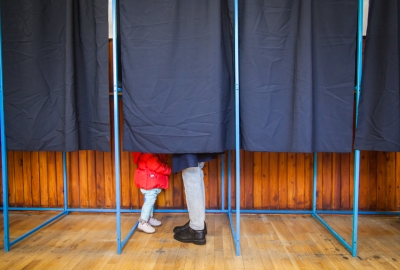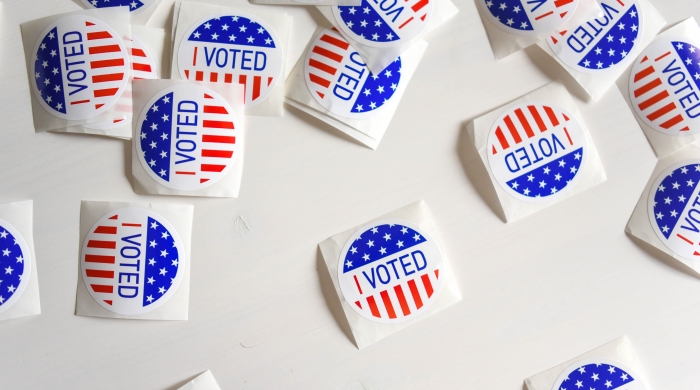
Early education policies, such as New York City’s Pre-K for All, have garnered attention on the 2020 presidential campaign trail. Support for free, high-quality early education must be contextualized within research in order to better understand why the education of young children matters and what these policies mean for our cities, states, and nation.
The Strengthening School Readiness through Pre-K for All project at NYU’s Institute of Human Development and Social Change is working alongside the NYC Department of Education (DOE)’s Division of Early Childhood Education to evaluate the impact of three Pre-K for All (PKA) professional development series for early childhood educators: Explore, Create, and Thrive. The aim is not to learn whether universal early education works but instead to uncover how much different types of professional development improves program quality and children’s school readiness, and which programs and children benefit most from the different types of professional development. By partnering to conduct research on PKA, we hope to not only provide guidance on how to improve NYC’s early education system, but also to inform policies and the public on how to deliver high quality, universal early education at scale.
Most psychologists agree that the early years of life are critical for positive development. Participating in high quality pre-kindergarten programs is strongly correlated to positive future outcomes such as higher graduation rates and lower crime rates. Moreover, high-quality early education facilitates language development, social emotional competence, and cognitive abilities. Bridging the gap between research and practice, specifically within large-scale programs with diverse populations such as PKA, is a huge challenge. Policies that are not backed by research and are not realistic in practice often fail. Therefore, it is essential to understand not only why our presidential candidates push for certain programs but also what those policies actually entail.
Bernie Sanders
Bernie Sanders, the self-proclaimed democratic socialist, is well-known for his progressive views on higher education. As a former preschool teacher himself, Sanders also recognizes the importance of early education and would guarantee childcare and universal pre-K for every child. He has previously proposed bills for universal pre-K and is now making universal pre-K a key component of his education campaign. He believes that it is essential to focus on children’s development and wants to consistently evaluate early education programs to ensure the most success. He plans on funding his education plan by implementing a Wall Street tax, which is estimated to generate up to $185 billion over 10 years. Sanders says on his website that investing in early education will “give children the opportunity to develop, learn, and reach their highest potential.”
Joe Biden
Joe Biden’s early education plan focuses on two primary goals: providing educators with adequate support and investing in all children from birth. His plan emphasizes the importance of racial and economic equality as well as the importance of providing teachers with greater resources. Biden calls for tripling the funds allocated to low-income schools and school districts. He will prioritize spending on raising teacher salaries, increasing professional development opportunities for teachers, implementing universal pre-K, and diversifying schools. He hopes that implementing universal pre-K will help diminish the achievement gap and expand and strengthen the economy. By providing families with early child development support, ensuring support for children with disabilities, providing a safe learning environment for both teachers and students, and increasing the number of school mental health professionals in schools, Biden aims to establish a more successful education system.
Elizabeth Warren
Elizabeth Warren has proposed a Universal Child Care and Early Learning plan, promising affordable access to high-quality child care for all children in the U.S. until they are of school-age. While every American family will have access to this, they are not required to participate in her program. The plan, which will be fully funded by her Wealth Tax, includes incentivizing states to invest in and improve upon their early education programs. It will also build upon the Head Start program and create partnerships between school districts, community members, religious organizations, and all levels of government. Under Warren’s plan, local communities will work together to create child care opportunities while the federal government will focus on increasing pay for child care workers and pre-K teachers and fully funding child care and pre-K for those falling 200% below the poverty line. She is calling her plan a win-win-win, and aims to give each child an equal chance for success.
Things to Consider
All three of these candidates have a fundamental understanding of why early education matters. Sanders, Warren, and Biden have all provided policies that will build upon and improve the current early education system and although their goal is the same, their means of achieving this goal differ. Both Sanders and Warren intend to tax the top 1% in order to fully fund, expand, and improve child care and Pre-K for All programs while Biden intends to work with state governments to offer more high-quality, universal pre-K programs. Despite these differences, it is notable that support for early education programs is unanimous among Democratic presidential candidates.
It’s encouraging to see that many of the top Democratic candidates value early education. Implementing country-wide universal pre-k programs alone is not enough to achieve widespread change. Candidates must also consider ways to evaluate their programs once established to ensure that pre-K programming is of high quality. Education policies must include stakeholders across all levels of government, research, and policy in order to maximize the likelihood of effective programming and equitable outcomes for young children in our country. Our team is dedicated to making Pre-K for All as effective as possible by evaluating the professional development tracks within the initiative. Our goal of this partnership is to provide the New York City Department of Education with the tools they need in order to make decisions backed by research in an attempt to strengthen PKA. New York City has the potential to be the gold standard for what Pre-K for All should look like so that other states and cities throughout the country can implement effective early education programs as well. Support for education programs and follow-up research partnerships like ours is essential to truly impact America’s education system.
This blog post was written, edited, and developed by students interns working on the Strengthening the Architecture for High Quality Universal Pre-K project.
Editing and Writing: Kayleigh Quirk
Writing: Sarah Geiz and Amira Janadi
Early Research/Fact Finding: Janet Gu and Abby Rusnak
Want to Learn More?
Check out these additional resources on early childhood education studies at NYU:
New York City Department of Education Pre-K for All First Year Review
Related
Strengthening the Architecture for High Quality Universal Pre-K
Since 2014, senior leaders in education research and practice at both New York University and the NYC Public Schools Division of Early Childhood Education (NYCPS-DECE) have fostered a research-practice partnership to support roll out of universal pre-kindergarten through Pre-K For All improving the quality of its programming. The purpose of this partnership is to provide quantitative and capacity-building solutions to educational problems faced by the NYCPS-DECE.
The Intersection of Research and Civic Engagement
Politicians and voters continue to debate policies and issues tied to IHDSC’s areas of research. IHDSC surveyed our faculty affiliate network about the intersection of research and civic engagement.



